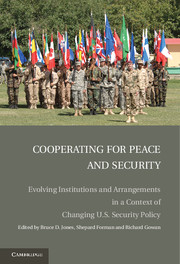 Cooperating for Peace and Security
Cooperating for Peace and Security Book contents
- Frontmatter
- Contents
- Contributors
- Foreword
- Acknowledgments
- I FRAMEWORK
- 1 Introduction: “Two Worlds” of International Security
- 2 “The Mission Determines the Coalition”: The United States and Multilateral Cooperation after 9/11
- 3 UN Transformation in an Era of Soft Balancing
- II ADAPTING COLD WAR INSTITUTIONS
- III NEW TOOLS, NEW MECHANISMS
- IV CONCLUSIONS
- Index
- References
3 - UN Transformation in an Era of Soft Balancing
Published online by Cambridge University Press: 22 January 2010
- Frontmatter
- Contents
- Contributors
- Foreword
- Acknowledgments
- I FRAMEWORK
- 1 Introduction: “Two Worlds” of International Security
- 2 “The Mission Determines the Coalition”: The United States and Multilateral Cooperation after 9/11
- 3 UN Transformation in an Era of Soft Balancing
- II ADAPTING COLD WAR INSTITUTIONS
- III NEW TOOLS, NEW MECHANISMS
- IV CONCLUSIONS
- Index
- References
Summary
From 2003 to 2006 Secretary-General Kofi Annan pursued the most ambitious overhaul of the United Nations since its inception. This chapter is written from the perspective of the team working with Kofi Annan on the reform agenda and reflects on the issues faced and choices made. In reviewing this experience, the chapter seeks to inform future choices on substance, politics, management and process that must be addressed in future reform efforts.
The ‘Kofi Annan agenda’ included:
a redefinition of collective security to bridge the security–development divide;
policy recommendations to strengthen existing security regimes (e.g. non-proliferation and disarmament) and to explore new regimes (e.g. on biotechnology);
the creation of new intergovernmental organs on peacebuilding and human rights;
expansion and reform of the Security Council;
new norms to govern the use of force by member states and the Security Council;
a new norm, the responsibility to protect, to legalize humanitarian intervention;
a definition of terrorism and the first UN strategy for counterterrorism;
new Secretariat offices for peacebuilding, conflict mediation and counterterrorism;
new member state commitments of resources to fight poverty and deadly infectious diseases;
a new policy committee for the Secretary-General to improve the quality of executive decision-making;
a thorough overhaul of UN budgeting, management and personnel rules.
Some UN watchers, especially in New York, have criticized this effort as too ambitious, too divisive and fundamentally unnecessary. They argue that the time for such an effort was not propitious; that some of the recommendations, especially regarding Security Council expansion, were misguided; and that the Secretary General was incorrect to take the lead in such a campaign, as prior experience shows that change at the UN usually comes when it is driven by member states.
- Type
- Chapter
- Information
- Cooperating for Peace and SecurityEvolving Institutions and Arrangements in a Context of Changing U.S. Security Policy, pp. 45 - 56Publisher: Cambridge University PressPrint publication year: 2009


